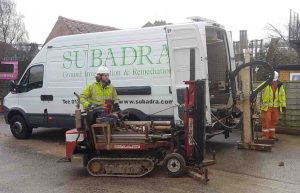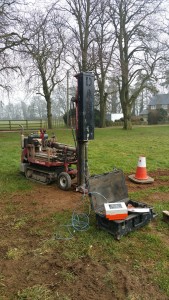
It’s not often we have two of our rigs working on the same site together, but this week we needed to do just that.
Our client had originally requested a plate bearing test to determine the bearing capacity of the underlying geology for a new extension to their mosque.
We advised that a plate bearing tests was not the right test. Instead , using our Geoprobe DirectPush and Terrier percussive drill rigs, we were able to complete soil sampling, dynamic probing and SPTs in the chalk underlying the site. These data then allowed us calculate the ultimate bearing capacity for future foundation design.

